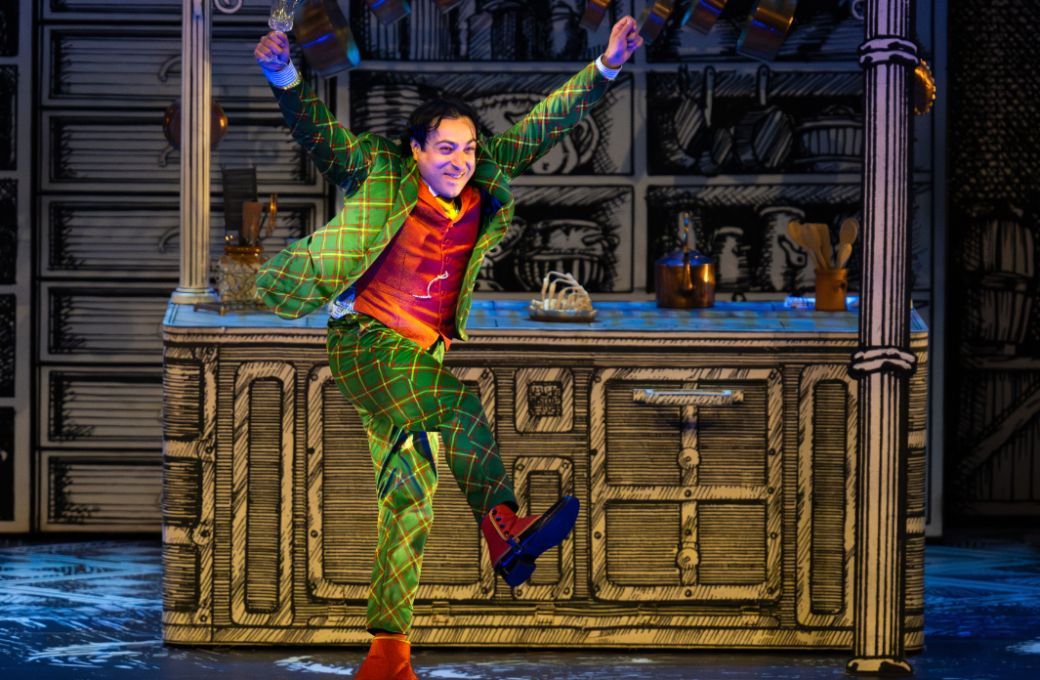Hot on the heels of the new Carmen opening this year’s Glyndebourne Festival comes a revival of Barbe & Doucet’s 2019 production of Die Zauberflöte. Despite a seemingly obvious fit of the opera with their track record for colourful, fairy-tale productions, the Canadian partnership had apparently turned down this opera three times previously, claiming they needed to find a way to embrace its more uncomfortable elements (chiefly the misogyny, but also racism in the character of Monostatos). Their ultimate get around here is to give a different voice to the Queen of the Night (more on that later), and to make Monostatos sooty from the boiler room, but that sadly does not airbrush away the references to an ugly black man being seduced by the sight of a woman's white skin in the libretto. Nonetheless there are many strong elements in their production, and overall their emphasis on extravagant playfulness wins out.
The fin de siècle hotel setting was inspired by Anna Sacher of Vienna’s Hotel Sacher, but also Rosa Lewis of London’s Cavendish Hotel. Complete with an army of pastry chefs, who replace Sarastro’s masonic forces, there is plenty of opportunity for spectacle and colour, while the more symbolic trappings of freemasonry are relegated to the set-drops. Visually, the production is delightful, from those meticulously hand-drawn (by Barbe) set-drops, with more than a nod towards Hockney’s The Rake’s Progress designs, to the joyful use of colour and lighting effects (particularly the ‘enlightened’ toques, and the twinkling bells). With puppetry originally designed by Patrick Martel, the current team, under puppet coach Mikey Brett, add additional visual humour and spectacle, with a snake of dishes, pillowy birds and giant men made out of cast-iron ovens for the armoured men, not to mention an outrageously bonkers birthing of Papagena’s six babies. The latter does rather upstage the music at that point, but the ‘double’ puppetry of the three boys controlling Tamino and Papageno is ingenious and highly effective.
Following the overture, in which a slight battle for control of tempo dampened the fizz, a set-drop glitch stalled the opening scene, requiring a ten-minute pause to reset (apparently to “switch the computer on and off again”). Once resolved, however, proceedings took off nicely, and the pace never let up, with never a dull moment.
As is often the way, Papageno frequently stole the show, with Rodion Pogossov delivering the comedy just the right side of pure slapstick, with plenty of deft sight gags, but convincing in his mischievously reluctant character. His direct baritone matched Paul Appleby’s lyrical tenor well vocally, and they formed a great double act, contrasting the simple innocence of Appleby’s Tamino with Pogossov’s comic resistance.
Alina Wunderlin was a dazzling Queen of the Night, with crystal accuracy and energy, but also capturing Barbe & Doucet’s intention to elicit some sympathy for the character, shifting away from the usual one-dimensional pantomime baddie. However, the attempt to counter the misogyny of the libretto by making her some kind of suffragette leader isn’t entirely successful – yes, Sarastro and co do finally adorn ‘Votes for Women’ sashes, but it’s not entirely clear how and why they were won over.
Lauren Snouffer’s Pamina had more strength of character than is often the case, with warm, touching tones, and James Platt’s Sarastro had weight and depth of tone, as well as gravity in delivery. Julieth Lozano Rolong as Papagena played up to Pogossov’s Papageno convincingly, and Alasdair Elliott’s Monostatos had a suitably cutting edge to his tone, despite the role being somewhat stripped of its pantomime nature.
The Three Ladies (Ann Toomey, Corinna Scheurle and Leia Lensing) were given more opportunity for comedy than usual, of which they took great advantage, and their fuller voices blended well. The Three Boys (Oliver Barlow, Sam Jackman and Oliver Hull) also rose to the occasion, with strong vocal delivery but also having fun with their comedic turns. Constantin Trinks directed the Orchestra of the Age of Enlightenment with energy and drive throughout and, apart from the overture’s scuffle over tempo, ensemble was tight, and the wind playing in particular had deft articulation. The Glyndebourne Chorus delivered their moments with stately grandeur.

So have Barbe & Doucet successfully reclaimed Die Zauberflöte? Well, it takes more than a shift to the boiler room to solve Monostatos, and the suffragette sashes won’t remove Schikaneder's sexism. But as a visually joyful celebration focussing on the positives of Mozart’s magical music and a fairy-tale, Enlightenment triumph of truth over darkness, this certainly delivers, and strong performances throughout made for a convincing opening for this revival.


